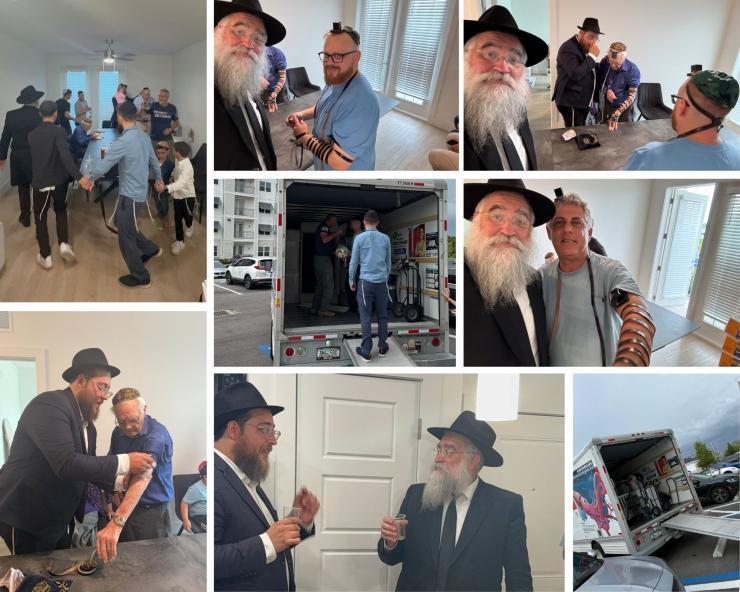New Book: Bochurim Dig Tunnels
Reb Zushe, who was born and raised in Lithuania and studied in the yeshiva of the famed Rov Elchonon Wasserman, spent most of the war years hiding in the forests and fighting with Tuvia Bielski’s partisans. After the war, when he moved to Eretz Yisroel and became a staunch chossid, he applied that same discipline and dedication to every directive he received from the Rebbe • Full Story
Reb Zushe, who was born and raised in Lithuania and studied in the yeshiva of the famed Rov Elchonon Wasserman, spent most of the war years hiding in the forests and fighting with Tuvia Bielski’s partisans.
After the war, when he moved to Eretz Yisroel and became a staunch chossid, he applied that same discipline and dedication to every directive he received from the Rebbe and every project he undertook on behalf of the klal. When the Rebbe called Zushe “my partisan” he was not only referring to his years in the forest, but also to the partisan-like determination he applied to every endeavor he undertook.
And undertake he did! In the post-war years, he became deeply involved in anti-missionary work. He saw a need and filled it, opening the Chabad yeshiva in Lud, educating thousands of children of chassidim and Yemenite Jews who had recently immigrated to Eretz Yisrael.
At the Rebbe’s behest, he co-founded the Reshet Oholei Yosef Yitzchak network of schools, set up N’shei Chabad in Israel, distributed sifrei Chassidus to the litvishe yeshivos, and moved mountains to establish the foundling city of Kfar Chabad. He met with and advised countless people from all walks of life, and was a devoted husband and father.
Throughout the years he wrote to the Rebbe extensively, sharing every detail of his own doings and those of Chabad communities across the country.
Zushe’s outreach in the transit camps increased when he began working for the Peilei Hamachane Hatorati.
Rabbi Lifshitz, one of the main organizers, described the work they did together:
“The situation was dire. The transit camps were completely closed off to any outsiders, especially to anyone who looked frum. Some were even surrounded by barbed wire, making it impossible to penetrate. We had but one goal—to get inside and boost the morale of the olim who were suffering from the forced secularization.
“We’d dig tunnels under the fences to get in. More than once, we were caught and beaten savagely by the camp guards. Sometimes, we’d spend a few days in jail. When we managed to infiltrate, do our work, and flee without getting caught, the police would come searching for us in the yeshivas.
“For the most part, we succeeded. Some nights the operatives stayed over, so they could continue their work in the camp the next day without having to worry about infiltrating again. Where did they hide at night? Under the beds. The olim always welcomed us happily; they knew we were there to save them.
“The temimim worked with great dedication and perseverance. Because of their devoted work, with the guidance of the Peilei Hamachane Hatorati, many immigrant children attended frum schools.”
The Rebbe greatly encouraged the work done by the members of the Peilei Hamachane Hatorati.
In a letter to the Rebbe (11th of Kislev 1951), Reb Zushe describes his work:
“I have been working for a few months now for an organization called Peilei Machane Hatorati. Most of the members are yeshiva students and Torah learners from various communities who are alarmed by the awful spiritual situation in Eretz Yisrael. Within half a year, thank G-d, we successfully incorporated an estimated 1,000 girls and boys into proper Jewish schools.”
One truck. That was the only vehicle in Kfar Chabad in the early days. An Egged bus stopped twice a day, but it was not enough. The residents suffered from lack of transportation.
The heads of Kfar Chabad tried again and again to work toward reform, but nothing changed until Reb Zushe and Reb Yonah were drafted to work their magic. As always, they fought for the cause. Every so often they went—together or alone—to the Egged offices or to the Ministry of Transportation, and after a full day of persuasion they managed to add another daily stop. With time, they had significantly improved the convenience of traveling into and out of the Kfar.
Each time they devised another plan to get what they wanted. Once Reb Zushe arrived at the Egged headquarters on Hamisgar Street in Tel Aviv and asked to meet with the chief supervisor. The supervisor listened to his spiel impatiently and said there was no way to add more busses.
Reb Zushe did not see this as a reason to give up. He said goodbye politely, but instead of leaving the office building, he wandered around until closing time. Early the next morning, he was back pacing the halls. On the third day, the supervisor saw him and yelled, “You can have whatever you want; just leave!”
The Partisan is available at your local book store, or at: BSDpublishers.com or at Amazon.com



180
Join ChabadInfo's News Roundup and alerts for the HOTTEST Chabad news and updates!









































I remember seeing Reb Zushe in 770 enlivening the crowd every Tishrei.
Will be interesting to read his book.